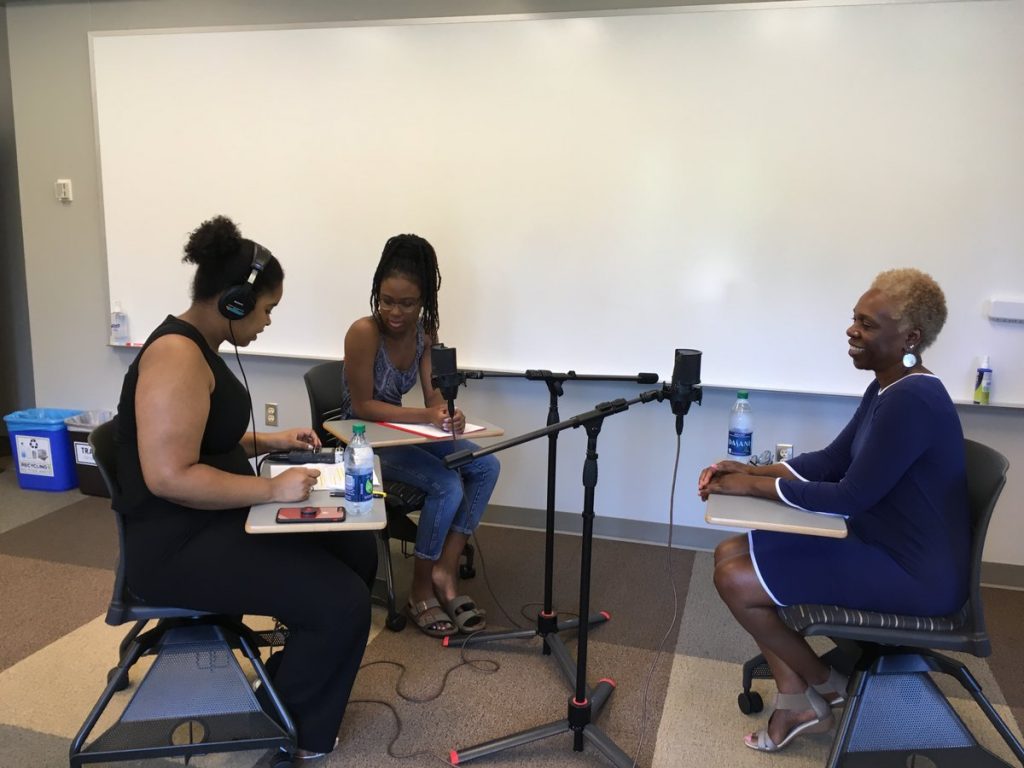by Mysia Perry
Mysia Perry is a rising sophomore from Richmond, VA with an intended major in Leadership Studies and minor in Sociology and Women, Gender, and Sexuality Studies. She is a part of the WILL* program, Peer Advisors and Mentors, Planned Parenthood Generation Action, and she is both an Oldham and Oliver Hill Scholar. This is her first summer working on the Race & Racism Project on Team Oral History, and she is very excited to begin working for more equitable environment here at the University of Richmond.
The following blog post contains some contentious language. Please consider the intent of its use as you read on.

When I began my work on the Race & Racism Project, I expected completely overt and outright instances of prejudice and discrimination. I expected there to be black face and nooses and swastikas and instances upon instances when people called those before me a nigger. I didn’t think about how the racist views I witness must derive from the racist views and discriminatory experiences of the past marginalized groups. I wish I’d paid more attention to the details, where racism lies in the more subtle, socially acceptable forms. While I conducted and assisted with the interviews, I wish I had listened more to how the experiences that aren’t completely outright and direct affected the alumni. I found that as I worked more and more on the interviews, it was easier to pull out those things. In the first interviews, there were things I wish I had dug deeper into. I find that because I was so caught up on the things that did not happen, I didn’t listen closely enough to the things that did. I didn’t focus on the connections between the stories.
I realized that when we began reflecting on our interviews in group meetings, a lot of the group had similar concerns. We had not heard what we expected. We had been so conditioned to identify racism as an overt discrimination against marginalized racial groups that we felt that was the only way it could manifest. We whined that we had no idea what direction we wanted to go in when it came to our podcasts and documenting these oral histories. Project archivist Irina Rogova and our other mentors (Sojourna Cunningham, Dr. Patricia Herrera, and Dr. Bedelia Richards) recommended that we take a break and then listen again to our interviews, except this time much more closely. It was then, for me, that it clicked. I had been stressing myself out so much about what I asked and didn’t get answered that I didn’t see how the answers I got were in some ways better. I had quickly overlooked how Greg Mitchell described the way he was viewed at the University of Richmond during his time here in the 1970s. I didn’t think more about why he was viewed that way until I had taken that second look. It was then that I began to wish I had thought more about the little things we still experience now. It was then that I began to wish I had asked more about their perspectives of why it happened that way.
As I reflect on my time working on interviews and creating these vital oral histories, I can really see an importance that I had never thought of. I knew before beginning this process that the world needed to hear these stories, but I think I doubted how much I needed to hear these stories. I think I doubted how much the University of Richmond would need these stories. This work has been essential in challenging the one-sided narrative that glorifies the majority and neglects marginalized groups on campus. Without it, it is easy to forget that people of color had an identity on this campus before now. It is hard to work to fix the issues that isolate the students of color and other marginalized groups on campus without acknowledging and evaluating those roots. I didn’t see the connections between my experiences and those that occurred over forty years ago until they were right in my face and undeniable.
These stories made me worry about what progress we’ve actually made. It made me see how although, there are more of us at the University of Richmond, with the number of black and brown students growing almost every single year, we still find it hard to feel that we have a place here. Listening to the interviews conducted by myself and my peers, I hear my story intertwined in those that occurred before my parents were even born. It astonished me. It makes me worry about what has actually changed other than numbers. As Dr. Bedelia Richards addresses in her blog post Is Your University Racist?, we know that there is much more to developing anti-racist universities than sheer numbers to prove diversity. It includes working to develop norms and policies that are not only focused on the success of the majority. I have so many friends who have had similar experiences to S. Joanne Morris, an black alumni of the class of 1979, who’s journey at UR began with an extraordinary weekend celebrating multicultural identities and ended with the pressure to prove she deserved a spot at the University of Richmond. She is not the first and definitely not the last. Even I am still experiencing it every day.
Mysia’s final podcast and the full oral history interview with S. Joanne Morris will be available on memory.richmond.edu in October 2018–please follow us here and on social media (Twitter, Instagram, Facebook) to know when interviews go live.
